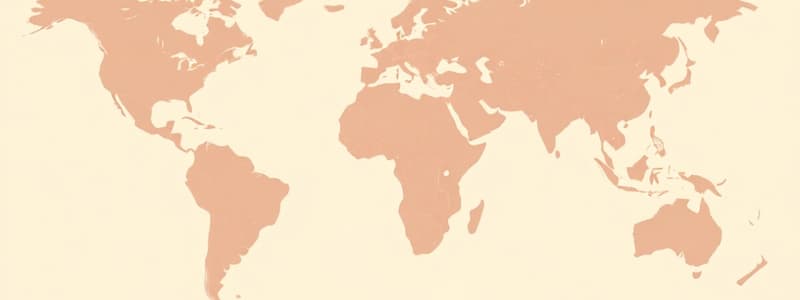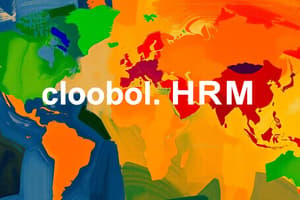Podcast
Questions and Answers
What is the primary role of a Transnational HRM system in a global organization?
What is the primary role of a Transnational HRM system in a global organization?
- To minimize costs by implementing the same HR policies used in the host country.
- To standardize HR practices across all locations to ensure consistency.
- To make HR decisions from a global perspective, incorporating diverse cultural inputs. (correct)
- To centralize decision-making related to HR in the home country.
When an organization's headquarters are located in one country but its facilities are operated in another, what term best describes the location of the headquarters?
When an organization's headquarters are located in one country but its facilities are operated in another, what term best describes the location of the headquarters?
- Third Country
- Home Country (correct)
- Expatriate Location
- Host Country
Which factor is considered the MOST influential in shaping Human Resource Management practices in global markets?
Which factor is considered the MOST influential in shaping Human Resource Management practices in global markets?
- The degree of governmental involvement in the economy.
- The host country's economic system.
- The cultural norms and values of each market. (correct)
- The educational attainment levels of the workforce.
Why is cross-cultural preparation important for employees taking on international assignments?
Why is cross-cultural preparation important for employees taking on international assignments?
What is the definition of 'repatriation' in the context of international assignments?
What is the definition of 'repatriation' in the context of international assignments?
In what context would an organization primarily use home-country, host-country, and third-country nationals?
In what context would an organization primarily use home-country, host-country, and third-country nationals?
Which of the following scenarios might lead to an employee experiencing 'culture shock'?
Which of the following scenarios might lead to an employee experiencing 'culture shock'?
What is the role of education in influencing HRM practices in global markets?
What is the role of education in influencing HRM practices in global markets?
What is a 'third country' in the context of global human resources?
What is a 'third country' in the context of global human resources?
Which best describes the primary goal of a multinational company when deciding where to build its facilities?
Which best describes the primary goal of a multinational company when deciding where to build its facilities?
What is the primary characteristic of a 'global organization' regarding facility locations?
What is the primary characteristic of a 'global organization' regarding facility locations?
What element is crucial for the successful repatriation of an expatriate, according to the provided information?
What element is crucial for the successful repatriation of an expatriate, according to the provided information?
How do international operations typically affect human resource practices?
How do international operations typically affect human resource practices?
What type of technology do 'digital nomads' primarily rely on to perform their work?
What type of technology do 'digital nomads' primarily rely on to perform their work?
What is the MOST important aspect to consider when preparing an employee for an international assignment?
What is the MOST important aspect to consider when preparing an employee for an international assignment?
Which of the following best describes an 'expatriate'?
Which of the following best describes an 'expatriate'?
What should organizations do in regards to employee's careers, to support a successful international assignment?
What should organizations do in regards to employee's careers, to support a successful international assignment?
Which of the following describes the primary function of an international organization as defined in the text?
Which of the following describes the primary function of an international organization as defined in the text?
What is the MOST important initial step an organization should take when managing global human resources?
What is the MOST important initial step an organization should take when managing global human resources?
When considering political and legal factors in global HRM, what aspect is MOST important for a company to understand?
When considering political and legal factors in global HRM, what aspect is MOST important for a company to understand?
Flashcards
Home Country
Home Country
The country where an organization's headquarters are located.
Host Country
Host Country
A country, not the home country, where an organization has a facility.
Third Country
Third Country
A country that is neither the home country nor the host country, in the context of an employer's operations.
Expatriates
Expatriates
Signup and view all the flashcards
International Organization
International Organization
Signup and view all the flashcards
Multinational Company
Multinational Company
Signup and view all the flashcards
Global Organizations
Global Organizations
Signup and view all the flashcards
Transnational HRM System
Transnational HRM System
Signup and view all the flashcards
Digital Nomad
Digital Nomad
Signup and view all the flashcards
Culture Shock
Culture Shock
Signup and view all the flashcards
Cross-Cultural Preparation
Cross-Cultural Preparation
Signup and view all the flashcards
Repatriation
Repatriation
Signup and view all the flashcards
Influences on Global HRM
Influences on Global HRM
Signup and view all the flashcards
Global Business Needs
Global Business Needs
Signup and view all the flashcards
Expatriate Preparation
Expatriate Preparation
Signup and view all the flashcards
Study Notes
- Home Country refers to the country where an organization's headquarters are based.
- Host Country is a country, different from the home country, where an organization operates a facility.
- Third Country is neither the home country nor the host country of an employer.
- Expatriates are employees who are assigned to work in countries other than their home country.
- International Organization sets up or facilitates operations in one or a few foreign countries.
- Multinational Company builds facilities in multiple countries to reduce production and distribution costs.
- Global Organizations strategically locate facilities based on their ability to effectively, efficiently, and flexibly produce a product or service, leveraging cultural differences.
- Transnational HRM System makes decisions from a global perspective, includes managers from various countries, and incorporates ideas from diverse cultures.
- Digital Nomad is a remote worker who uses technology to work from various locations worldwide.
- Culture Shock involves disillusionment and discomfort during the adjustment to a new culture.
- Cross-Cultural Preparation is training provided to employees and their families before an assignment in a foreign country.
- Repatriation is the process of preparing expatriates to return to their home country after a foreign assignment.
Global Business and HRM
- Increasing numbers of companies are entering global markets through exporting and operating in foreign countries.
- Organizations require employees who understand customers, suppliers, and local laws in different countries and can adapt to various situations.
- Organizations can hire combinations of home-country, host-country, and third-country nationals.
- Organizations operate on various scales, including as exporters or international, global, or multinational entities.
- Global organizations need a transnational HRM system that makes decisions from a global perspective and incorporates ideas from diverse cultures.
Factors Influencing HRM in Global Markets
- Culture is the most significant influence, encompassing shared assumptions about the world and ideals.
- Education levels in different countries can vary significantly.
- The political-legal system, including the type of government, laws, and regulations, impacts global HRM.
- A country's economic system and government involvement influence HRM practices.
International Operations and HR Practices
- International operations impact workforce planning, selection, training and development, performance management, total rewards, and labor relations.
Managing and Preparing Employees for International Assignments
- Extensive preparations are necessary when an employee is selected for an international assignment.
- Expatriate preparation includes cross-cultural training and career development activities.
- Support increases the likelihood that the expatriate will gain valuable career skills and handle repatriation successfully.
- Communication about changes at home and validation of their work abroad support expatriates during repatriation.
Studying That Suits You
Use AI to generate personalized quizzes and flashcards to suit your learning preferences.




